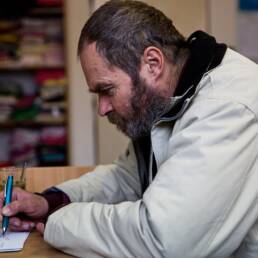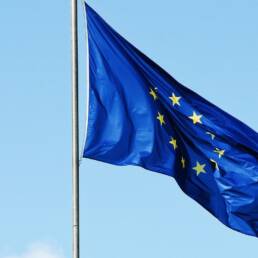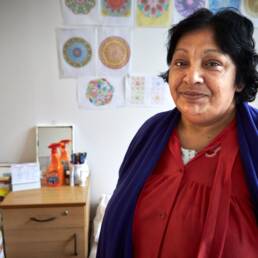Author
Sonia De Voght
Communications Director
Tel: +32 (0)2 235 26 56
SDeVoght@caritas.eu
Poverty and inequality are rising again
One in five people in Europe are at risk of poverty and social exclusion. This equates to a staggering 110 million people who do not have enough money to make ends meet and to live a dignified life. (1)
It is a sad fact that in 2020 in the European Union not everyone has access to a decent standard of living. Indeed, whilst poverty and social exclusion in the EU have been slowly declining over the last six years, we were last year still 12 million short of achieving the target set by the Europe 2020 strategy and poverty target, to reduce the number of those in poverty by at least 20 million by 2020. (2)
Poverty is a violation of fundamental rights and deprives people of the chance to develop and participate in society equally. It blocks them from accessing other fundamental rights such as employment, healthcare and housing. Poverty builds barriers in our societies and exacerbates already gaping inequalities.
The UN recognises this and prioritises the eradication of poverty in the Sustainable Development Goals (SDGs), with SDG 1 establishing the goal to end poverty, as a prerequisite for sustainable development. Europe, unfortunately, still has a long way to go in achieving this goal.
COVID-19: A wake up call
The COVID-19 pandemic has brought existing inequalities into sharp relief. Since the pandemic hit Europe, poverty and inequality has also started rising, with sharp increases predicted to be to at least the levels seen during the 2008 economic crisis, i.e. over 125 million people at risk of poverty and social exclusion.
It has been said of the global pandemic that “we are all in the same storm, but not in the same boat”, because of the hugely negative impact of the pandemic which has generally been felt much more harshly by some groups of people. Even before the pandemic, certain vulnerable groups were disproportionately at risk of poverty and social exclusion, such as children, single parents (mainly women), people with disabilities, the long-term unemployed, as well as migrants and black and ethnic minorities.
It is these groups of people who are suffering the effects of the pandemic even more, therefore exacerbating existing inequalities, hitting the poorest people, households and groups hardest as well as poorer countries and areas, as highlighted in a recent report by the European Anti-Poverty Network (EAPN) on the impact of the pandemic.
Minimum income: a lifeboat in the storm
In this context, well designed and effective Minimum Income schemes have a vital role to play. It is the income support benefit of last resort, which should guarantee people income protection and a route out of poverty, particularly when combined with essential services, like affordable housing, health and social care, and education and by support to access decent jobs, or to participate more fully in local communities if they are not able to work. (3)
Despite the fact that the EU recognises this by giving increasing priority to soft policy mechanisms aiming to guarantee an adequate minimum income, it has so far failed to take substantial action to ensure people’s access to adequate minimum income. Only two Member States currently pay benefits near the poverty threshold for some households (Ireland and the Netherlands), whilst in countries like Romania, Bulgaria and Hungary the net income of minimum income barely reaches the 20% level of the national risk-of-poverty. (4)
This year’s EAPN Poverty Watch reports, launched for the International Day for Eradication of Poverty, produced by anti-poverty networks at the national level, have overwhelmingly highlighted the lack of adequate, accessible and enabling minimum income schemes. Such schemes should be made a key priority to stem the emerging tsunami of poverty and inequality that threatens the EU and the rest of the world, as well as providing the only basis for a sustainable economic recovery which includes everyone.
German Presidency Council Conclusions call for progress on Minimum Income
The EU has a key opportunity to make progress on guaranteeing an adequate minimum income for everybody, offering a glimmer of hope to EU citizens gripped by fear and insecurity for the future. Following weeks of intensive discussions led by the German Presidency, the EPSCO – prior to its meeting on 13 October –adopted Council Conclusions on “Strengthening Minimum Income Protection to Combat Poverty and Social Exclusion in the COVID-19 Pandemic and Beyond”. Unfortunately, by not fully embracing the original Conclusions drafted by the German Ministry, Member States have missed an opportunity.
The final Conclusions do, however, offer important progress on guaranteeing adequate, accessible and enabling minimum incomes and open the door to a proposal for a binding European framework. This would help to bring Member States together to work towards a shared political and moral commitment to end poverty and social exclusion, as underlined in SDG 1. This is the best way to create “a Europe with a social heart”, one that stands for decent living and working conditions and defends social rights and will help to restore faith in the European project.
The Council Conclusions acknowledge that Minimum Income schemes contribute to the social protection of the most disadvantaged groups in society, including people hardest-hit by the COVID-19 crisis, and contribute towards increased employment and inclusion in society. Importantly, they call on all EU countries to “make efforts to provide information for people who potentially meet the nationally established eligibility requirements about their rights to minimum income protection” and to encourage people to apply for benefits, to reduce the shockingly low take-up rates (up to a 40% shortfall).
The Council Conclusions also invite national governments and the European Commission to implement principle 14 of the European Pillar of Social Rights stating that “everyone lacking sufficient resources has the right to adequate minimum income benefits ensuring dignity at all stages of life, and effective access to enabling goods and services”. They also call upon national governments to engage with civil society organisations and, whenever appropriate, with people experiencing poverty in the development, updating and implementation of Minimum Income schemes.
It is time for the European Commission to step up and propose an EU Framework Directive on Minimum Income!
These Council Conclusions are the long-awaited springboard to move forward on a binding EU framework. The Commission must now show leadership and propose a Framework Directive on Minimum Income, as one of the key EU initiatives in the Action Plan to implement the European Pillar of Social Rights, due to be adopted early in 2021.
When other measures have failed to make the progress needed, binding EU legislation is now essential to ensure that national Minimum Income schemes set high social standards guaranteeing everyone an adequate minimum income throughout their lives and access to benefits and services. It would also tackle the gaping holes in national social protection schemes which the COVID-19 pandemic has exposed.
The Commission and Member States must now intensify their efforts to address and overcome the structural causes of poverty, social exclusion and inequality and make decisive progress to improve national social protection systems. Whilst the Commission can build on the existing EU policy framework, when such scant progress on poverty has been made, it needs to up its ambition.
It should turn existing recommendations, including extensive Country-Specific Recommendations in the European Semester, into binding minimum requirements that guarantee social rights, which no country can ignore. Existing and new EU funds, including as part of the Recovery and Resilience Facility, will be essential to support poorer countries, whose Minimum Income schemes are still not adequate, not least to make European solidarity a reality. Research shows that public support is high, including for an EU-level initiative that would require financial support for countries that face the most difficulties in improving the adequacy of benefits.
Strong new legal base for a Framework Directive
There is new and compelling evidence that there is a strong legal basis for introducing a binding EU framework for adequate national minimum income schemes. The recent Expert Opinion, commissioned by EAPN, provides the legal and policy arguments on the feasibility and added value of introducing such a binding framework.
It strongly recommends the adoption of an EU Framework Directive on minimum income that entitles individuals to enforceable legal rights. The time is now for the European Commission to move from words to concrete action. (4)
Follow EAPN’s campaign on #EUMinimumIncome.
Notes
- All data in this article is 2018 data
- This article was originally published on the occasion of the International Day of Eradication of Poverty, 17 October, on The Brussels Times.
- See EAPN Sept 2020 – Summary of EAPN Position on adequate minimum income.
- EC Joint Employment Report 2020, pp. 128-129












